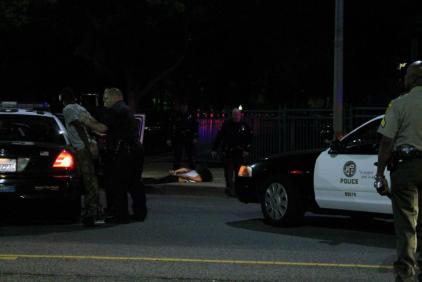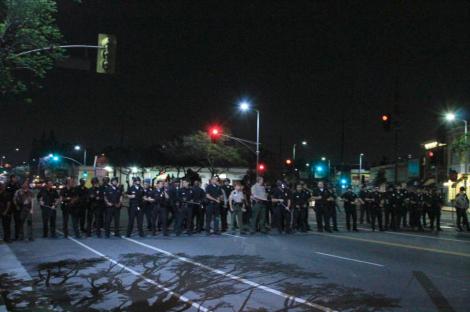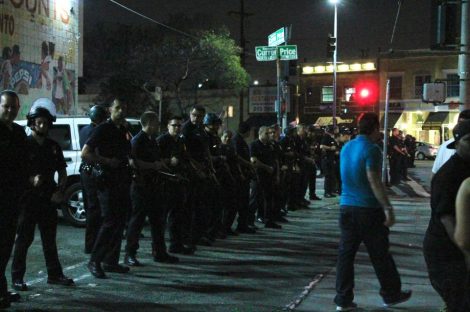Makiah Green
Instead of studying for the last final of my undergraduate career, I am writing this letter in protest of the University of Southern California’s latest atrocity. Last night, students gathered at a house near campus to celebrate their completion of another rigorous school year. Many attendees were graduating seniors. Almost all attendees were minority students: African-American and Latino.
I did not attend last night’s party, but I could hear the helicopter circling from my dorm room over a mile away. When the Facebook posts and photos started appearing on my news feed around 2:30am, I had flashbacks to an era I wasn’t even alive to suffer through. I was too scared to go outside, legitimately fearing that an officer would see me and arrest me for being Black and inquisitive. I can only imagine how my peers felt when they saw over twenty LAPD patrol cars pull up and release 79 officers to end a peaceful, congratulatory party.
It is inexpressibly disheartening to hear fellow students recount horror stories of police brutality two weeks away from being among the first in my family to graduate from a four-year university. To know that my college degree holds no weight in the face of institutional racism and discrimination is sobering. Since the three most recent shootings, all triggered by non-USC affiliated Black males, that occurred on and around USC, there has been an increased presence of LAPD and other security forces around campus. Amid the tense racial climate that followed, I patiently endured the ignorant comments, racist blog posts and suspicious stares, but the intolerance has reached a new high. Six of my friends spent the night in jail.
To be clear, I do not have a problem with increased protection or security. Who’s to say that a shooting won’t occur at the next student party? It could happen, God forbid, and I understand why USC wants to be prepared. My issue lies within the selective surveillance of minority-hosted parties, as if crimes only happen among high concentrations of melanin. Hundreds of criminal offenses, including sexual harassment, rape and assault happen every Thursday night on Greek Row, a undeniably white establishment. Yet, the culprits of the Department of Public Safety Crime Reports distributed to USC students and faculty, seem to be strictly limited to Black and Latino males (6’2-6’5 in dark hoodies). These reports, together with the newly constructed, other-izing gates around campus, have instilled an unhealthy amount of fear in students, administrators and safety officials. We have been trained to double check for USC logos on the sweatshirts of minority males on and around this campus to make sure that they’re “one of us.” It doesn’t surprise me that LAPD has adopted the same attitude. For them, it has been this way for decades.
If the USC Department of Public Safety feels justified in allowing nearly a hundred police officers to shut down a minority attended party due to the fact that African-Americans were responsible for the recent shootings, we’re in for a bigger battle than most students bargained for when they decided to enroll here. That ideology reeks of racial profiling and associates the behavior of a few criminals with the entire Black student body, a comparison that makes my stomach turn. While LAPD is busy sending all of their manpower to harass the future of America’s leaders, the real trouble lies within my campus’ freshly painted fences.
USC should not be permitted to reap the benefits of diversity without facing its complexities. You can’t help the hood without loving it first. When USC’s founders decided to break ground in South Central instead of Malibu, it signed up for a difficult and delicate community partnership that needs to be revisited.
To me, protection means opening our gates even wider for at-risk youth who are in desperate need of positive role models, not locking them out after 9pm. I will feel safe on this campus when I see DPS officers negotiating with LAPD, pleading with them to let students of color party in peace. I will feel welcomed when I see a public statement from President Nikias acknowledging the discrimination and blatant racism that my people have had to endure since we were first admitted into this school. I will become a proud Trojan when the USC community finally grows to reflect and embrace its resilient surroundings.
To my peers, I am sorry that we have to dedicate hours that should be spent studying to defend our freedom of assembly. None of us have the time to write letters, plan meetings and rally against injustice, but we must. The next generation of brilliant Black students is depending on us to guarantee their right to a dignified college experience.
*All photos by Christopher James
this piece was republished from Green’s personal blog with her permission. You can view the original posting here.



Pingback: LAPD, USC, We Demand Real Solutions to Racial Profiling | The Interloper @ USC·
Pingback: I’m a Scholar, Not a Criminal: Is the LAPD Racially Profiling Black Students? | Intent BlogIntent Blog·
Pingback: LAPD’s Racial Profiling and Police Brutality Against Students at USC | Life at the Co-op·
I just have one comment. USC was built in an affluent neighborhood. The neighborhood slowly changed, but the founders did not decide to build in the ‘hood’. Other than that, I agree with you. I find it disgusting that USC claims to be so diverse, yet remains so stuck in the past.